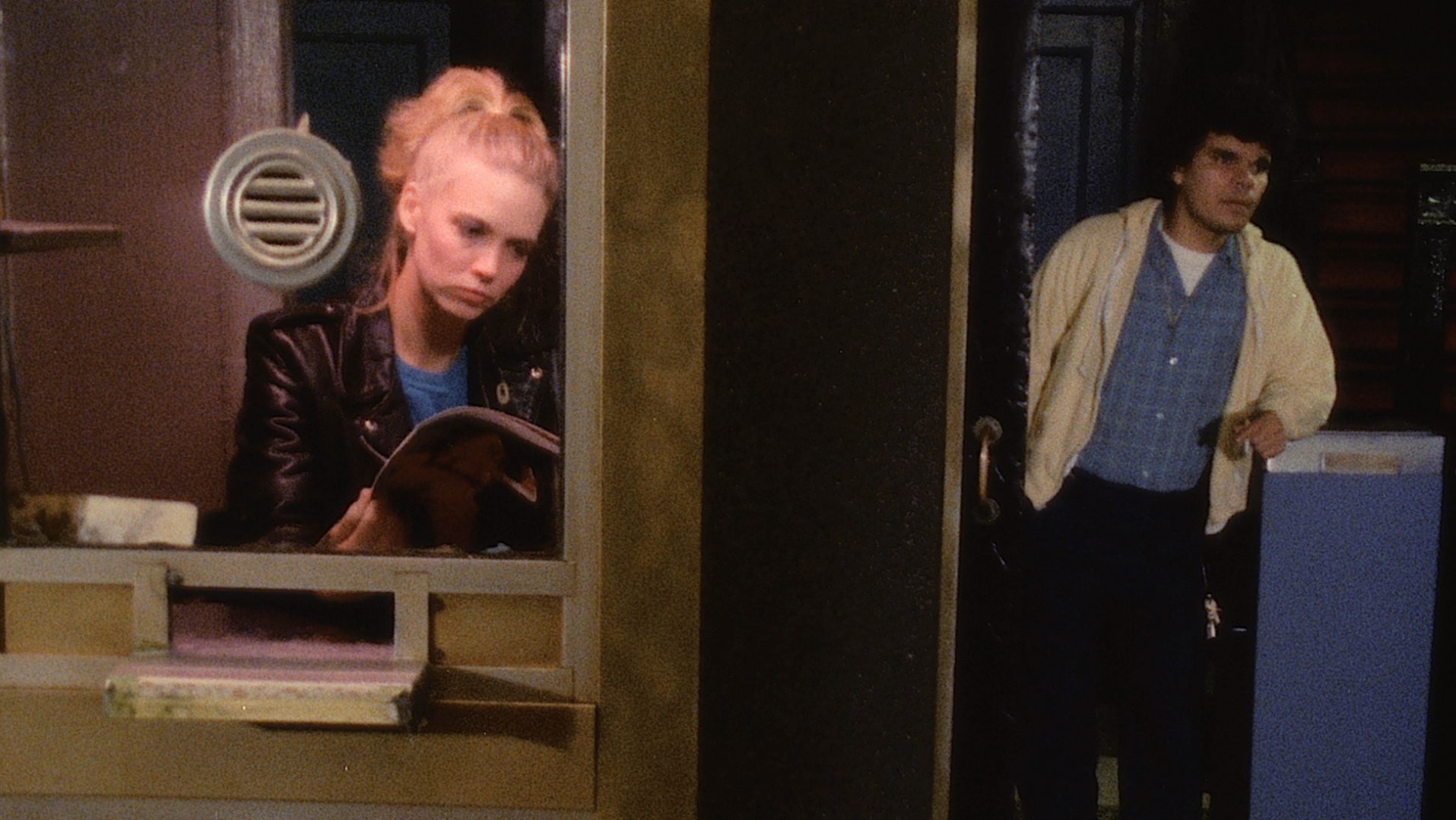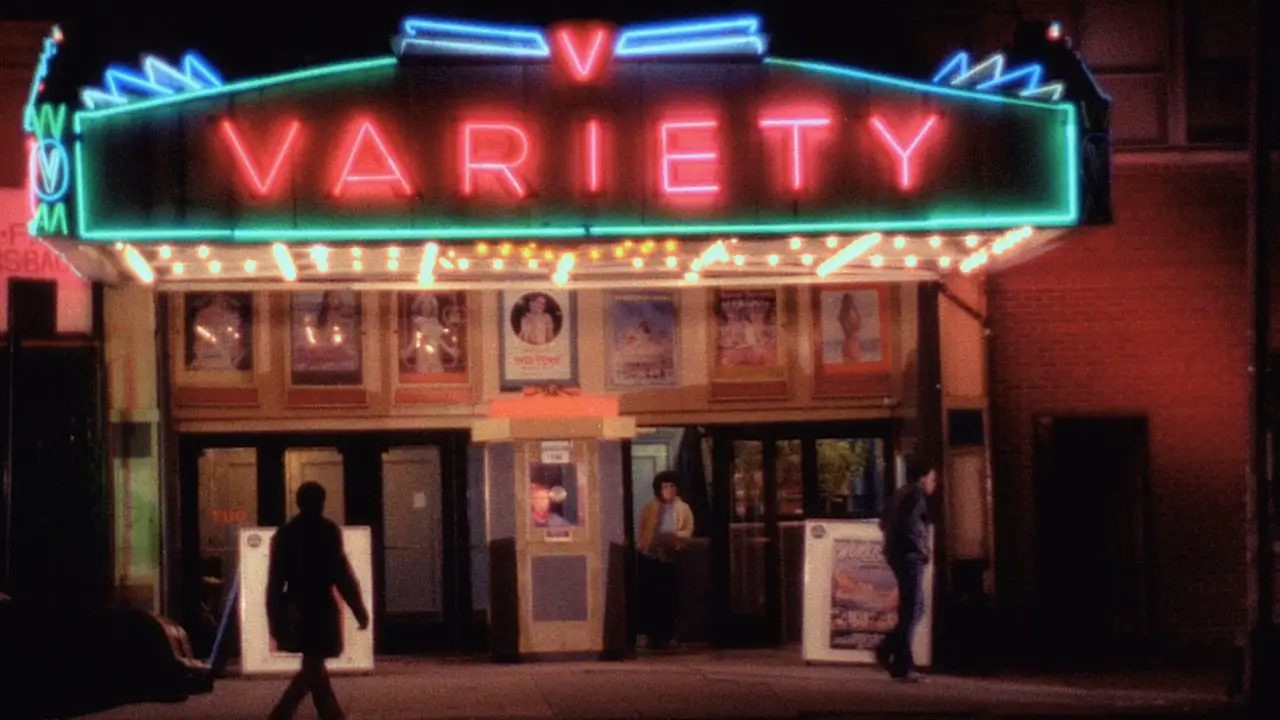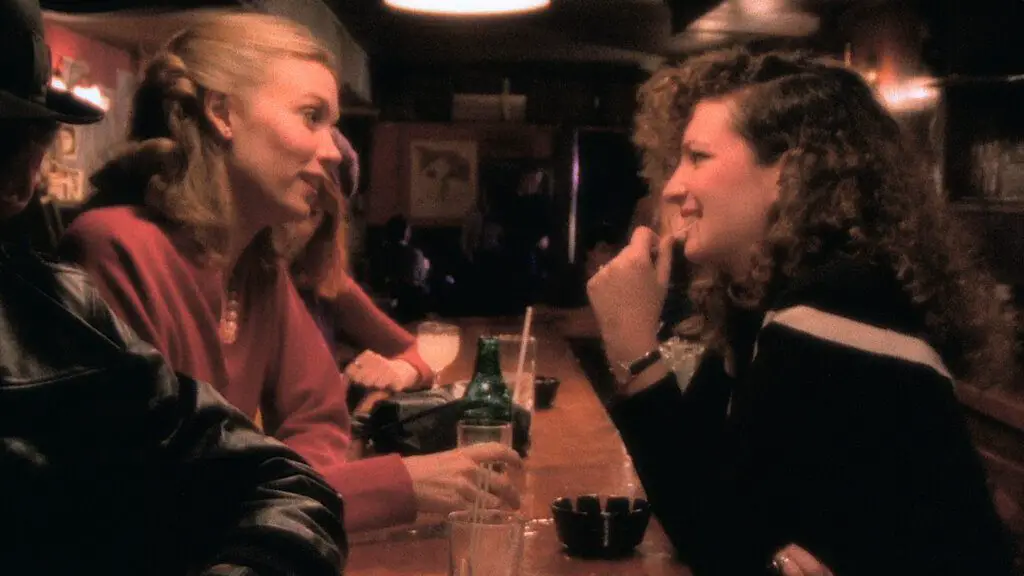“My life, my sexual identity, is as a feminist, but my films don’t fit easily into that category – they are not easy films at all, in fact.” – Bette Gordon
Going to the movies is an act of voyeurism—much the same as watching television or scrolling social media. In the end, we are looking and deriving pleasure from looking. But movies require a little more; it’s looking amidst delving into your psyche as it dredges up emotions connected to and unconnected to the narrative.
The art of looking is crucial to film.

In 1975, film theorist Laura Mulvey wrote a book called “Visual Pleasure and Narrative Cinema.” Mulvey coined the now misunderstood and misused phrase, the male gaze. A book that a young filmmaker, Bette Gordon, read, and while she agreed with it, she wondered what it said about her. “I’m a woman, and I like to watch.”
Add to that the idea of obsession is also part of every cinephile’s psychological makeup. Alfred Hitchcock made a career out of gazing and dissecting obsession, the twin themes that drove Gordon to want to “turn the thriller on its head.” Switching the roles of Kim Novak and Jimmy Stewart from Vertigo, making Novak the watcher and Stewart the enigmatic object.
All of this culminates in the 1983 hypnotic genre-splitting Variety, a film about a young woman’s discovery of her own sexuality and obsessions. Part of the No-Wave, an avant-garde music and visual art scene that included the likes of Jim Jarmusch, Gordon’s Variety serves as a hypnotic documentation of a time and place and a fierce punk-rock feminist thriller.
Gordon’s first feature film is both an act of an auteur and the work of a collective. Her distinctive visual voice captures moments that are both real and fabricated. Yet, she worked closely with collaborators and friends, including Kathy Acker, Nan Goldin, and Spalding Grey, who has an off-screen cameo as a dirty phone caller. The script stems from a series of ideas Gordon gave Acker, who then transformed them into a script using hers and other women’s stories to craft the listless Christine (Sandy McLeod).
McLeod’s performance is the glue of Variety, a combination of passivity and activity that breeds a rich, layered, and haunted performance. McLeod’s vulnerability and curiosity make Acker’s words and Gordon’s staging sing in ways they might not have with another actor. There’s a natural artifice she brings, a brave timidity, as it were, that makes it impossible to take our eyes off of Christine.
Variety is a slice-of-life observation, narrative psychological thriller, and erotic taboo dream. Gordon and her camera people, Tom DiCillo and John Foster, capture the New York City of our imaginations while also capturing it as it truly was in 1983. Variety creates a claustrophobic atmosphere by using the artifice of neo-noir, the shadows, and urban setting and recreating the bustling and overflowing New York of the 1980s.
But they also capture specific artifacts of the time, such as a giant answering machine or the way Christine takes a smoke break by walking INTO the movie theater. We can feel the grime, filth, and stench of the city as Gordon follows Christine into public swimming pools, sex shops, and porn theaters. All of it comes with the bonus of seeing a baby-faced Luis Guzman as the theater manager.

Guzman shines in what little screen time he has. It is an early testament to his too often underutilized talent of existing within the confines of a film without mugging for attention. He somehow behaves as if he has been and always will be there.
The real-life location, the Variety Theater, is a story unto itself. A real porn theatre, the Variety, started life as a stable, which was renovated into a vaudeville theater, which then became a porno palace before ultimately finding death in a doomed Off-Broadway theatre. But it’s the neon lights that capture Christine’s attention and ours. Something about those bright lights reflecting off those rain-soaked streets lends a dream-like substance to Variety.
Gordon, DiCillo, and Foster use the camera as if we and they were peeping toms. Almost every scene is shot from an angle, suggesting we, the audience, are peeping in. Rarely is a scene shot straight on, but if it is, the camera is placed in the shadows, as if we are peering out from the dark into their world.
Gordon and her camera team frame McLeod within mirrors, windows, ticket booths, and even the silver screen itself as she imagines herself in one of the pornos playing in the theater. She is framed within frames, constantly reminding us that we are watching, looking, as the events unfold.
Variety is as much about Christine’s imagination and desires as her spiraling psyche. A thoroughly feminist film, it nonetheless is a divisive movie simply because it provides no moral instruction and shows a conflicted woman misbehaving while also embracing her sexuality.
Variety feels just as bracing today as in 1983 because Gordon pushes Christine to places dominated by men. She enters sex shops, works the ticket booth at a seedy pornographic theater, walks the loading dock of the local fish market, and goes to a ball game. Her very existence causes the men to tense, as if Christine is an invader of their space. As a woman, she is the reason they are there, but it’s the male fantasy of a woman that’s welcome, not a real one.
The ballgame, like all sports, is another voyeuristic activity. I’d argue baseball is more so than other sports because of its leisurely pace. It allows spectators to watch other spectators. Gordon thrusts every frame of Variety into a frame of looking. As such, while watching Variety, you become absorbed, like you’re seeing something you’re not supposed to.
But Gordon never lets the fantasy noirish aspects subjugate her observational tendencies. Shot in multiple locations, such as the infamous bar Tin Pan Alley, where friend Nan (Nana Goldin) bartends, Gordon gives us snapshots and conversations of women. The conversations range from relationships to sex work and its practicalities and dangers.
All the while, McLeod’s Christine seems drawn to the images on the screen, transfixed by the desires she has but haunted by the unfulfillment of her own desires. It’s in this luminary space, between the aching and the satisfaction, that Variety lives and breathes. Perhaps this is why the film proves so divisive.

Acker’s dialogue grows increasingly more explicit as Variety goes on, repurposing dialogue so often used by men and having it delivered by women. Christine’s partner, Mark (Will Patton), grows disturbed and uncomfortable as Christine becomes more sexual. Their scenes grow more and more uncomfortable as Variety unfolds.
Mark asks why she’s going on these increasingly explicit agents. Christine replies, “I’m telling you about my life.” A writer, Christine is trying to express herself and her needs through erotic language, and Mark seems at a loss at how to respond. Gordon and Acker make these scenes progressively stark until finally, while at a bar, Christine delves into a disturbingly absorbing erotic tale while Mark plays pinball.
The scene begins with Gordon and her camerapeople framing Patton’s rear end dead-center of the frame as Christine’s voice plays over the soundtrack. Mark listens, his hips thrusting as he plays pinball and drinks beer, Christine’s words hanging in the air. Gordon cuts to Mark and Christine, whose faces seem placid, but her eyes seem to glimmer with a vivid intensity.
In a conversation with Jane Root, Gordon spoke on Christine’s way of talking: “Christine says things out loud, and although it’s in male language—people disagree with me, but I deny that there is a female language—articulating things out loud is important. It’s not something that everyone would do, but something that I like to do.”
Meanwhile, Christine seems lost in her own erotic daydreams. Dreaming of a man, Louie (Richard M. Davidson), whom she knows little about and who abandoned her during a date at a ballgame. A frequent guest at the Variety, she becomes fascinated with both him and what he brings out in her. Gradually, she begins to stalk him as her fascination with this stranger blossoms into something beyond mere curiosity.
Variety documents Christine’s growth from an unsure woman into a self-possessed femme fatale, dressing and behaving like the imagery she’s been inundated with. Gordon explores both the natural and unnatural ways women navigate discovery through a patriarchal system that warps the image of who or what they can be.
One scene has Christine trying to meditate. But she’s unable to relax as Ila Von Hasperg’s editing crafts a montage of Louie and other men shaking hands. Gordon and her camera frame just the hands, showing how Christine is both surrounded by and fascinated by the patriarchy and men in general. It is a more eerie and strangely hunting version of Ryan Gosling’s discovery of the patriarchy montage from Greta Gerwig’s Barbie.
Unable to relax, she begins to work out, reclaiming her agency and distracting herself from her thoughts. Christine’s transformations are both physical and psychological. Her newfound sexual confidence comes like an awakening as she changes the way she dresses and how she addresses men.

Hasperg and Gordon alternate between montage and long single takes, creating the documentary feel that permeates so much of Variety. Add to this the way Gordon and her camera team don’t strive for perfection, with shots of Christine walking, the frame cutting off her head, making the visual language feel more like it was filmed in the shadows than on a shooting schedule. Variety hums with a sense of the forbidden and the taboo; even more the sex shops and sex talk, it’s by the simple way Gordon makes every scene feel as if it were stolen from the private lives of the characters.
Underneath, Variety hums the haunting, pulse-quickening Jazz score of John Laurie’s lurid soundtrack. Filled with smooth strings and palpable brass punctuations, the soundtrack adds sweat to the film’s clenched fists. Seductive and haunting, Laurie and Gordon drag us by our collars and pull us toward the screen.
My hands were clenched for multiple scenes, from Christine’s Henrey James-esque monologue by the pinball machine to witnessing her watch Louie close up at his restaurant. My heart raced, and I was on the edge of my seat, watching this woman fall down a rabbit hole.
Variety worms its way into your brain and refuses to leave. It scoops out the dark underbelly of the human psyche and wonders why we are the way we are. That it denies us the answer or the conclusion to Christine’s transformation is part of its genius. Gordon denies us the joy of a conclusion.
Instead, Gordon forces us to imagine Christine’s fate and destiny in our minds. This must be maddening for this generation of plotcels, but the anger and frustration only miss the crux of what Variety is striving to say. Variety isn’t about what Christine will become; it’s about watching her become what she will become. It’s a movie about looking.
Images courtesy of Horizon Films
Have strong thoughts about this piece you need to share? Or maybe there’s something else on your mind you’re wanting to talk about with fellow Fandomentals? Head on over to our Community server to join in the conversation!

